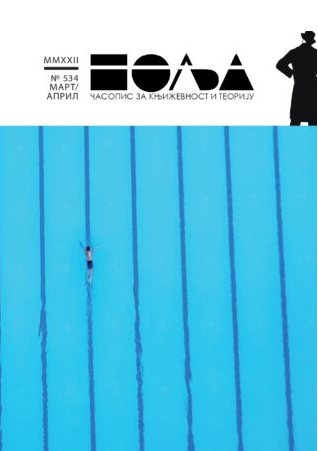
We kindly inform you that, as long as the subject affiliation of our 300.000+ articles is in progress, you might get unsufficient or no results on your third level or second level search. In this case, please broaden your search criteria.

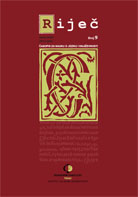
One of the most important issues of the poetic work of Njegos is reading of his texts at different levels in order to disclose all the interferring meanings of his long poem named Luca Microcosma as well as the shorter ones. In this way a special, interfering level can be opened which is of a great importance for the complete understanding of his creative procedure. This is strongly related to the process of polygenesis- circulation of the ideas which, in a special discourse, find the causes and consequences of a certain type of initiation, interaction, transformation and transfiguration.
More...
Review of: Tatjana Bečanović, “Poetika Lalićeve trilogije”, CANU, Podgorica, 2007. godine
More...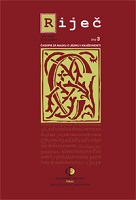
The author points out the complexity and numerousness of the stylistic literary tools, used by Mihailo Lalic while organizing the novel. Their numerousness and complexity create the aesthetic value of the language of the novel. The author of the paper believes that Lelejska gora is the most valuable novel written by Mihailo Lalic due to its evident and complex figurativeness.
More...
Review of: Adnan Čirgić, Ivo Pranjković, Josip Silić, Gramatika crnogorskoga jezika, Ministarstvo prosvete i nauke Crne Gore, za izdavača Slavoljub Stjepanović, ministar, Podgorica, 2010, Pobjeda AD, str. 358
More...
Review of: Tatjana Bečanović, “Naratološki i poetički ogledi”, CID, Podgorica, 2009, ss. 201
More...
Review of: Novak Kilibarda, Usmena književnost Crne Gore, CID, Biblioteka Crna Gora, Podgorica, 2009.
More...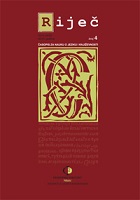
Balša Brković’s novel Privatna galerija aims to contest a literary territory for new identities, in order to articulate the new Montenegrin experiences. This literature offers an alternative to the traditional cultural discourse on masculinity. In this highly conscious metafictive text, there is also an inconsequence, the blind spot. The essentially patriarchal dichotomy of Self and Other in the sex/gender relations remain. Privatna galerija does not threaten the status quo of the patriarchal sex/gender relations. However, it is clear that Montenegrin literature is at the beginning of creating new masculinities that are trying to break out from the patriarchal masculine ideal and, in doing so, making room for men’s practice of change.
More...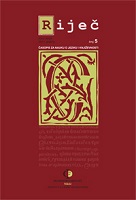
Review of: Zbornik radova sa Trećeg međunarodnog slavističkog naučnog skupa Njegoševi dani, Univerzitet Crne Gore, Filozofski fakultet, Studijski program za crnogorski jezik i južnoslovenske književnosti, Nikšić, 2011
More...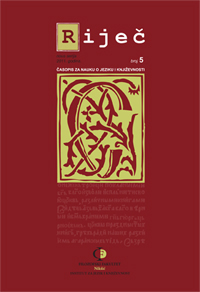
A genre diversity in the novel Ljubavnik Duklje derives from a thousand years which are covered through its plot which makes us believe that this novel is certainly one of the most diverse in the contemporary Montenegrin literature regarding the thematic scope, techniques and modified forms of storytelling, as well as the organization of time and space. Since the plot is related to the fate of one family and its good and bad times, it is evident that this is a family novel. The novel can certainly be defined as a novel- river, since it describes the family events through a pretty long period of time. Its dense dynamics of mythical and historical events displays ranging from the formation of Duklja which happened in 1042 statehood, till its reconstruction in 2006 which makes us conclude that it's a historical novel and since the reinterpretation of myth and history have been presented by the main character Velun Seoč, it can be said that the novel is a novel of s character. Regarding the fact that the novel has been intertwined by the idea of the Montenegrin identity, it actualizes the contemporary events through the prism of narrator’s impressions and the author's position, having the elements of the novel of ideas, including political novel with a message.
More...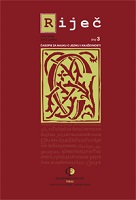
By using the linguistic and stylistic approach to studying Nikola Lopičić’s language, the author has tried to analyse the lexical complexity and, at the same time, to examine the degree of its stylistic expression, bearing in mind that a lexical language level plays a special role in a writer’s stylistic expression. Therefore, the author has selected, aside from the general words, a significant number of lexemes taken from dialects, words of foreign provenance and the authentic writer’s vocabulary, and the expressions that, are, due to their unusual ways of formation and meaning, especially stylistically marked, paying attention to augmentatives and diminutives that complement the lexical categories in the language of Nikola Lopicic. The analysis demonstrates the expected deference in style of the listed lexical categories, but also the uncontested fact that a rich and varied vocabulary in a writer’s language is an essential element for enriching his literary expression.
More...
This paper analyses a distinctive linguistic procedure related to the syntax of the language expression. It turns out that the cases of stylistically marked word order, which depends on the writer’s freedom in organizing, (that it, in breaking syntactic units within a phrase or a sentence,-otkloniti ovaj dio) is an important criterion for characterizing a writer’s language and style. The analysis shows how a syntactic and stylistic procedure makes syntactic units unusual and grant them status of syntax stylistic expressions which testify of the complex language and stylistic turnovers in the language of Janko Đonović, a poet of the picturesque Crmnica.
More...
In this paper, the author highlights the characteristics of conjunctions and other words functioning as connectors in the language of the lyrical folk poetry of Montenegro. The aforementioned part of speech is observed in the language of the lyric folk poetry of Montenegro, and the results obtained have been compared to the use of language in the Montenegrin oral and written tradition (according to monographs and works on them). The author has studied the common and distinctive language features found in the lyric folk poetry, folk speeches and the language itself. The author paid a special attention to the manners in which the conjunctions are used, as well as their form features which could be considered somewhat unusual, observed from the point of view of the modern literary and language norm.
More...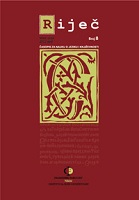
This work analyses the semantic and stylistic values of the simple present as used in dialogue of the epic folk decasyllabic poems which were handed down to Vuk Karadzic by the most prominent folk epic poets in Montenegro – Starac Milija and Tesan Podrugovic. Although the Present tense in its literal meaning and its purpose is a stylistically neutral, using selected examples the author points out that its performance of "automatism of perception" may be more contextually conditioned (e.g. participation in its imagery, phraseologisms, directives and commissives or when involved in building an impression of credibility of events described in the poems).
More...
This paper analyzes the structure of the provocative novels "Wedding" (1950) and the "Tide of war" (1973) by Mihailo Lalic. Apart from the syntactic, stylistic analysis and semantic follows the author has paid a special attention to the structure of the vocative statements. The expressive meaning of the vocative can be found within the forms of the vocative emotional reactions and semantically empty vocative saying. The aim of the usage of the structures of semantic categories provocation is to draw attention of the interlocutors, exercise or achieve directivity which is inextricably linked to the pragmatic circumstances. The writer didn’t align the vocative statements with the appropriate situation and expectations of participants, since they were built on the verbal conflict and expressing negative and often hostile relations between the interlocutors.
More...
Radovan Zogovic declares himself as a rival to the Avant-Garde, i.e. as a supporter of social-realist literature procedure in his essays. This paper deals with his explicit attitudes do not fully concur with the immanent poetics. In the opinion of critics, there was always a material cause as a precondition for the formation of his poetry that could have been any social event or occurrences in nature. Since the contemporary versology allows us to comprehensively study poems we conclude that the form of Zogovic verses‟ construction are pretty anti- traditional. The unequal length of verses and stanzas, frequent reduction of rhymes and punctuation and enjambement, by which technical and semantic independence was achieved (because sometimes one word is a bearer of verse), as well as the exclamativity of the lyrical subject’s positions are the elements of the expressionist proceedings equally represented in Zogovic’s free and rhymed verses.
More...
Review of: Marina Katnić-Bakaršić, “Između diskursa moći i moći diskursa”, Naklada Zoro, Zagreb, 2012
More...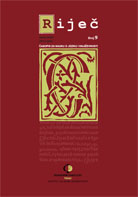
U saradnji sa Centrom za razvoj i očuvanje kulture manjina Crne Gore (CEKUM) Studijski program za crnogoski jezik i južnoslovenske književnosti je 17. decembra 2013. godine obilježio stogodišnjicu rođenja istaknutog crnogorskog književnika Ćamila Sijarića. Prepoznavši kvalitete književnog rada ovog pisca i potrebu da se njegovo djelo valorizuje, program je podržala i NVO ,,Hiperion’’.
More...
Dana 26. decembra 2013. godine u organizaciji Studijskog programa za crnogorski jezik i južnoslovenske književnosti i Opštine Nikšić, u Nikšiću je upriličeno pjesničko veče Jevremu Brkoviću, kojim se obilježavalo osamdeset godina pjesnikovog života i šezdeset godina njegovog stvaralaštva. Uvodnu riječ je imala mr Ana Pejović, u ime Centra za kulturu Opštine Nikšić, Brkovićeve stihove govorio je Marijan Mašo Miljić, a nakon toga su govorile: prof. dr Rajka Bigović Glušica, prof. dr Tatjana Bečanović i mr Olga Vojičić-Komatina.
More...
U organizaciji Studijskog programa za francuski jezik i književnost a u sklopu obilježavanja pedesetogodišnjice postojanja Filozofskog fakulteta, u subotu, 5. oktobra 2013. godine u Nikšiću održan je naučni skup “Le Monténégro et La France-regards croisés” – « Crna Gora-Francuska : prožimanje gledišta »
More...